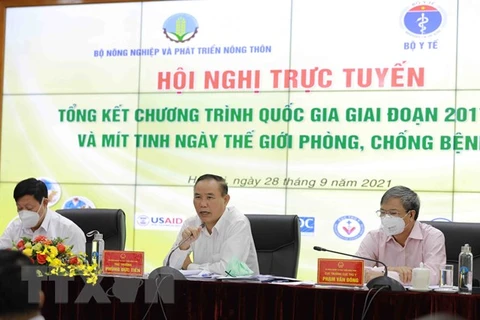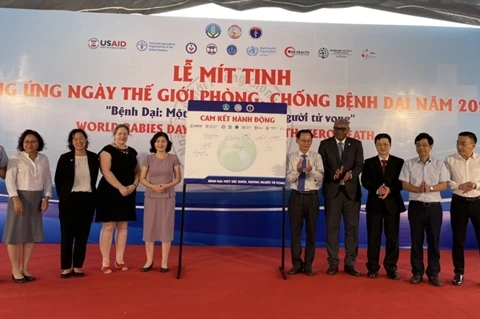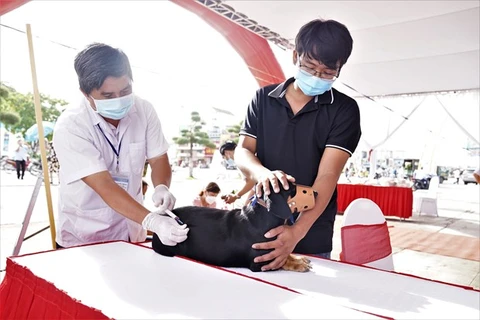Hanoi (VNA) - Although some progress has been made over the past 10 years, Vietnam continues to record between 70 and 100 human deaths due to rabies annually.
The Vietnamese Government is committed to achieving the 2030 goal of eliminating human deaths from dog-mediated rabies by renewing the National Programme on the Control and Elimination of Rabies 2022–2030.
This year’s World Rabies Day (September 28) takes the theme of “All for One, One Health for all”. On this occasion, the World Health Organisation (WHO) and the Food and Agriculture Organisation of the United Nations (FAO) in Vietnam, the US Agency for International Development (USAID) and the US Centres for Diseases Control and Prevention (CDC) have committed to further supporting Vietnam in eliminating rabies deaths by 2030. The group is also focused on consolidating essential policies and mechanisms in this regard.
This event also reminds stakeholders that the fight against rabies cannot succeed overnight, but needs to be carried out in a sustainable manner to achieve the ultimate goal.
The Ministry of Health (MoH) reported that in the first eight months of this year, the country recorded 61 deaths from rabies in 26 cities and provinces, higher than the figure in the same period last year.
Although the number decreased significantly in some localities, it still increased in 20 provinces between 2017 and 2021 as compared with the 2011-2016 period, the ministry said.
Dr Angela Pratt, WHO Representative in Vietnam, emphasised the need for strong commitment and the targeting of priority areas in order to eliminate deaths by 2030.
“We must ensure equitable access to vital health services, including rabies post-exposure prophylaxis and pre-exposure prophylaxis, for underserved communities. This will save lives,” she said.
“Strong coordination between animal, human health, and other sectors is vital to ensure prevention and control programmes are efficiently and effectively managed.”
Dr Rémi Nono Womdim, FAO Representative in Vietnam, highlighted increasing international and high-level political support for One Health as a sustainable solution to combat threats such as rabies.
He stressed the importance of dog vaccinations, saying it is the most cost-effective single intervention to protect humans from contracting rabies.
“By working together using the One Health approach, to increase rabies vaccination coverage in animals to reach at least 70%, we can break transmission of rabies to humans and accelerate the progress toward Zero by 30 goal”, he added.
Sharing the same view, Dr. Lindsay Kim, Global Health Security Programme Director, US CDC office in Vietnam, emphasised the role of the One Health approach and assured of CDC support in rabies prevention and control efforts.
“We strongly advocate for the One Health approach, which integrates human, animal, with the environment. The US CDC is proud to support Vietnam in adopting this approach to eliminate rabies deaths by 2030.”
Accordingly, the centre is collaborating with the Ministry of Agriculture and Rural Development (MARD) and other partners to develop national guidelines for rabies surveillance using the One Health approach.
Meanwhile, Dr. Myat Htoo Razak, Senior Global Health Security Advisor, USAID Vietnam, laid stress on coordinated multi-sectoral responses, especially animal and human health systems, and active engagement with communities for rabies prevention and control.
The joint efforts aim to build awareness of rabies and vaccinate dogs.
Advocating for strong political commitment and mobilizing financial resources for rabies prevention and control also plays an important role in the elimination of human deaths from rabies, he stated.
In Vietnam, the MoH, the MARD, agencies and localities, with support from the international partners, are working together in implementing a national programme in order to minimise rabies deaths. /.
























